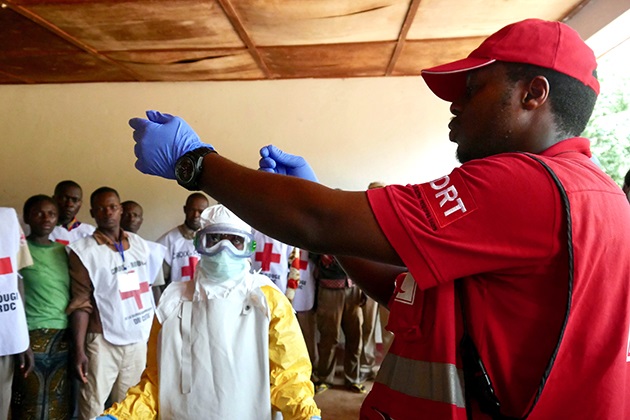

Ebola
Équateur, Democratic Republic of the Congo, May-July 2018
Overview
Within hours of the outbreak being declared on 8 May 2018, WHO released US$2 million from its Contingency Fund for Emergencies, deployed a team to augment capacity in the field, and activated an emergency incident management system.
Unlike previous Ebola outbreaks in the country, this one involved four separate locations, including an urban centre with river connections to the capital and to neighbouring countries, as well as remote rainforest villages. There were initial concerns that the disease could spread to other parts of the Democratic Republic of the Congo, and to neighbouring countries.
24 July 2018 marked the end of this, the ninth outbreak of Ebola in the Democratic Republic of the Congo. The World Health Organization congratulated the country and all those involved in ending the outbreak, while urging them to extend this success to combatting other diseases in the Democratic Republic of the Congo.
Disease outbreak news - start of the outbreak - end of the outbreak
News
Videos
Stories
Key documents
Situation reports
17: 25 July 2018
Situation report: declaration of the end of the Ebola outbreak in Équateur Province
16: 18 July 2018
Situation report on the Ebola outbreak in Équateur Province
15: 12 July 2018
Situation report on the Ebola outbreak in Équateur Province
14: 3 July 2018
Situation report on the Ebola outbreak in Équateur Province
13: 26 June 2018
Situation report on the Ebola outbreak in Équateur Province
12: 22 June 2018
Situation report on the Ebola outbreak in Équateur Province
11: 19 June 2018
Situation report on the Ebola outbreak in Équateur Province
10: 12 June 2018
Situation report on the Ebola outbreak in Équateur Province
09: 8 June 2018
Situation report on the Ebola outbreak in Équateur Province
08: 5 June 2018
Situation report on the Ebola outbreak in Équateur Province
07: 1 June 2018
Situation report on the Ebola outbreak in Équateur Province
06: 29 May 2018
Situation report on the Ebola outbreak in Équateur Province
05: 25 May 2018
Situation report on the Ebola outbreak in Équateur Province
04: 20 May 2018
Situation report on the Ebola outbreak in Équateur Province
03: 18 May 2018
Situation report on the Ebola outbreak in Équateur Province
02: 14 May 2018
Situation report on the Ebola outbreak in Équateur Province
01:11 May 2018
Situation report on the Ebola outbreak in Équateur Province
Disease Outbreak News
- 25 July 2018
Ebola virus disease – Democratic Republic of the Congo - 6 July 2018
Ebola virus disease – Democratic Republic of the Congo - 20 June 2018
Ebola virus disease – Democratic Republic of the Congo - 13 June 2018
Ebola virus disease – Democratic Republic of the Congo - 11 June 2018
Ebola virus disease – Operational readiness and preparedness in nine countries - 6 June 2018
Ebola virus disease – Democratic Republic of the Congo - 5 June 2018
Ebola virus disease – Democratic Republic of the Congo: Points of Entry - 30 May 2018
Ebola virus disease – Democratic Republic of the Congo - 23 May 2018
Ebola virus disease – Democratic Republic of the Congo - 21 May 2018
Ebola virus disease – Democratic Republic of the Congo: Update on Ring Vaccination - 17 May 2018
Ebola virus disease – Democratic Republic of the Congo - 14 May 2018
Ebola virus disease – Democratic Republic of the Congo - 10 May 2018
Ebola virus disease – Democratic Republic of the Congo
Funding
- WHO’s rapid response and scale up of operations in the DRC was funded by a total of US$4 million disbursement from the WHO Contingency Fund for Emergencies (CFE).
- WHO and partners appealed for US$57 million to stop the spread of Ebola. The total funds received by all partners, as tracked by OCHA, amount to US$63 million.
- Funding towards WHO’s contribution to the Ebola response was provided from: Italy (€ 300 000), UN CERF (US$ 800 000), Gavi (US$ 1 million), USAID (US$ 5.3 million), Wellcome Trust and UK-DFID (US$ 4.1 million), UK-DFID (£5 million), Germany (€5 million), Norway (NOK 8 million), Canada (CAD$1 million), World Bank PEF (US$ 6.8 million), Japan (US$1.3 million), EU ECHO (€ 1.5 million) and from the Ebola MPTF (US$ 428,000) bringing the total to approximately US$ 36 million.
- Germany’s contribution is in recognition of the critical role the WHO CFE has played in responding to the Ebola virus disease outbreak in the Democratic Republic of the Congo and will go to replenish the CFE, which provided initial funds for the response efforts.
- In-kind contributions for medical evacuation were received from Norway. EU ECHO support was provided for flights between Kinshasa and Mbandaka. Technical expertise was provided by Guinea, the UK, USA and Germany through the Global Outbreak Alert and Response Network (GOARN). Merck provided the vaccines that were used to protect over 3300 people.
WHO partners
|
|
